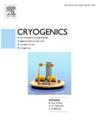Effect of DCT with post-tempering on impact toughness and tensile strength of nimonic-90 superalloy
IF 2.1
3区 工程技术
Q3 PHYSICS, APPLIED
引用次数: 0
Abstract
The present work focusses on the effect of Deep Cryogenic Treatment on impact toughness and tensile strength of Nimonic-90 super alloy. Significant improvement in tensile strength and impact toughness has been recorded due to the evolution in microstructure at cryogenic temperature (−196 °C) which includes grain size, micro voids and dimples. Out of 24 h and 36 h soaking period, best results in impact toughness, tensile strength and yield strength were obtained corresponding to 36 h soaking period. The maximum percentage improvement in impact toughness, tensile strength and yield strength was 46.32 %, 19.34 % and 17.16 % respectively when compared with untreated sample. The maximum percentage elongation was observed for the sample which was soaked for 24 h. In 36 h soaking period, the amount of dimples was more as compared to 24 h soaking period. The brittle fracture zone decreased in the Charpy impact samples with the increase in the soaking time from 24 h to 36 h. This was due to the formation of coarse and deeper dimples which absorbed more energy during fracture. The tensile strength and yield strength were found higher for 36 h soaking period than 24 h soaking period because in 24 h soaking period, the presence of voids and small number of carbides made the matrix of Nimonic-90 weaker than 36 h soaking period samples.
后回火DCT对镍-90高温合金冲击韧性和抗拉强度的影响
研究了深低温处理对Nimonic-90高温合金冲击韧性和抗拉强度的影响。由于低温(- 196°C)下微观结构的变化,包括晶粒尺寸、微空洞和韧窝,拉伸强度和冲击韧性得到了显著改善。在24 h和36 h的浸泡时间中,36 h的浸泡时间在冲击韧性、抗拉强度和屈服强度方面效果最好。与未经处理的样品相比,冲击韧性、抗拉强度和屈服强度的最大提高率分别为46.32%、19.34%和17.16%。浸渍24 h的试样伸长率最大,36 h的韧窝数量比24 h的多。随着浸泡时间从24 h增加到36 h, Charpy冲击试样的脆性断裂区减小,这是由于在断裂过程中形成了粗而深的韧窝,吸收了更多的能量。结果表明,浸泡36 h后,合金的抗拉强度和屈服强度均高于浸泡24 h后的合金,这是由于浸泡24 h后,合金基体中空洞的存在和少量碳化物的存在,使得合金基体比浸泡36 h后的合金弱。
本文章由计算机程序翻译,如有差异,请以英文原文为准。
求助全文
约1分钟内获得全文
求助全文
来源期刊

Cryogenics
物理-热力学
CiteScore
3.80
自引率
9.50%
发文量
0
审稿时长
2.1 months
期刊介绍:
Cryogenics is the world''s leading journal focusing on all aspects of cryoengineering and cryogenics. Papers published in Cryogenics cover a wide variety of subjects in low temperature engineering and research. Among the areas covered are:
- Applications of superconductivity: magnets, electronics, devices
- Superconductors and their properties
- Properties of materials: metals, alloys, composites, polymers, insulations
- New applications of cryogenic technology to processes, devices, machinery
- Refrigeration and liquefaction technology
- Thermodynamics
- Fluid properties and fluid mechanics
- Heat transfer
- Thermometry and measurement science
- Cryogenics in medicine
- Cryoelectronics
 求助内容:
求助内容: 应助结果提醒方式:
应助结果提醒方式:


